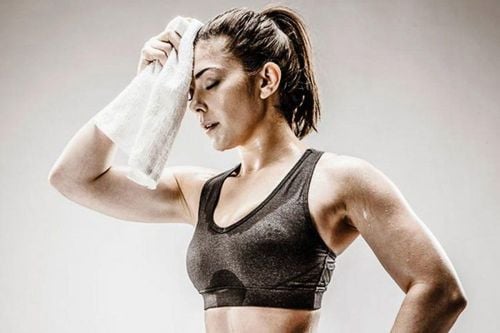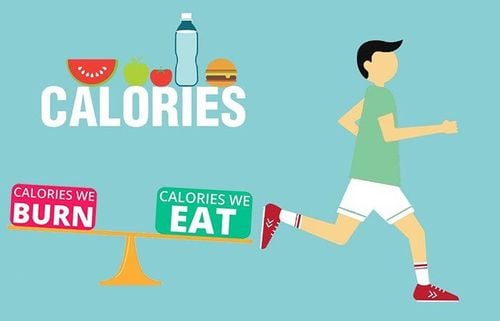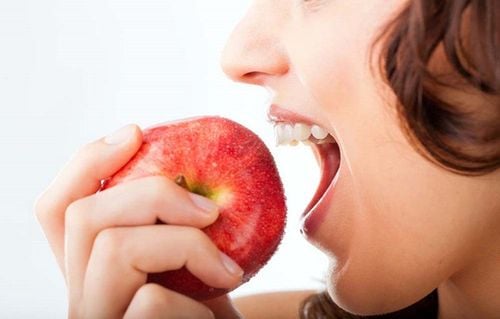Diligent exercise can help reduce excess fat in different body parts. However, many people have a misconception that the more they sweat, the more weight they'll lose. On the contrary, sweating a lot without adequately replenishing body water can lead to dehydration. Therefore, to effectively lose weight, each person needs to understand and implement correctly.
1. How do sweat glands work?
Before finding the answer to whether sweating a lot helps with weight loss, readers need to understand the mechanism of sweat glands. Specifically, when body temperature becomes too high, the body automatically cools itself by sweating. This is a phenomenon where water is secreted through sweat glands located under the skin. This way, body temperature decreases.
The number of sweat glands varies for each person, determined by genes. People who sweat a lot usually have many active sweat glands under the skin (averaging 2-4 million glands). The amount of sweating depends on genes (number of sweat glands), age, weight, environmental factors, gender, etc. Women have more sweat glands than men. However, men's sweat glands are more active compared to women (over 50% of glands active).
2. Does Sweating Help with Weight Loss?
So, does sweating help with weight loss? Many believe that when exercising, the more we sweat, the more body weight we'll lose. However, this is not entirely accurate. In reality, the number of calories burned during exercise is not solely based on how much or little the body sweats.
In fact, sweating means the body is losing water, not burning fat. Overweight people typically sweat more than normal people. Excess body fat increases body temperature. When you exercise intensely, the body sweats to release the generated heat, helping you feel cooler. This also means sweating does not burn calories.
When you sweat, you might lose weight. However, the weight loss is actually water and mineral loss, not fat reduction through sweating. And immediately after drinking water, your body will return to its original weight. Therefore, sweating does not increase calorie burn. Nevertheless, sweating is a good tool to assess whether the activity intensity is appropriate and if improvements are needed,...

3. Sweating - Benefits and Drawbacks
3.1. Benefits
The greatest benefit of sweating is helping to reduce body temperature. Additionally, sweating has many other benefits such as:
- Enhancing skin health: High-intensity exercises stimulate blood circulation. This provides skin cells with adequate oxygen and nutrients, making skin healthier;
- Measuring exercise intensity: Sweating during exercise indicates you're training at an appropriate intensity. However, if you feel dizzy, tired, or have muscle pain, this might signal you're overexerting yourself.
3.2. Drawbacks
If you sweat excessively, you'll easily become dehydrated. Particularly, hot and humid weather will cause more sweating. Therefore, if you secrete about 450g of sweat, you should drink a glass of water to replenish body water. You should hydrate your body sufficiently and continuously, avoiding waiting until you feel thirsty and your body begins to dehydrate. During exercise, carry a water bottle and drink regularly to prevent dehydration risks. Dehydration symptoms include: Exhaustion, rapid or weak heartbeat, loss of consciousness, dizziness, excessive sweating, not urinating for 8 consecutive hours,...
If you often sweat excessively, you might have hyperhidrosis. If sweating affects your daily life, you should see a doctor for examination and treatment. Additionally, if you sweat at night or suddenly sweat profusely and continuously without clear reason, you should see a doctor immediately. Some dangerous symptoms to watch for include: Chest pain, difficulty breathing, rapid heartbeat, fever above 40°C.

4. How to Lose Weight and Burn Fat Effectively?
If weight loss isn't from sweating, where does it actually come from? It comes from the intensity of your workout. To lose weight, you need to burn more calories than your body absorbs. Thus, to lose weight, you should do exercises at medium or high intensity. Some effective fat-burning and weight-loss exercises include: Fast walking, running, swimming, cycling, aerobics, dancing, boxing, martial arts,...
During these exercises, muscles will draw energy from fat reserves in the body. Therefore, excess fat is burned through the activities you perform. Additionally, if combined with a reasonable diet, you can effectively lose weight and achieve your desired weight and body shape.
For these exercises, pay attention to training endurance. This means you should exercise for at least 30-60 minutes per session and maintain a regular exercise habit (at least 5 times/week) to get the best fat reduction results. Each morning, you can also drink a warm lemon water to stimulate digestion and boost metabolism. Eating more cucumber (during breakfast, lunch, dinner, and snacks) can also help support weight loss.
Focusing solely on increasing sweat production is not the best way to lose weight. If you want to lose weight, you should patiently follow a suitable diet and maintain regular exercise habits.
To arrange an appointment, please call HOTLINE or make your reservation directly HERE. You may also download the MyVinmec app to schedule appointments faster and manage your reservations more conveniently.








